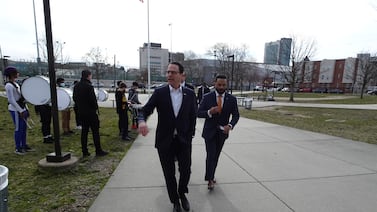Two bills before the Colorado legislature would spur changes to the system Colorado uses to measure school quality and improve performance. Both bills are in response to an audit of the school accountability system, despite that review finding the system to be “reasonable and appropriate.”
One bill, which enjoys broad bipartisan support, would create a task force to recommend changes to the system. A more controversial bill would seek to dramatically reduce the use of standardized testing.
While finding that Colorado’s school accountability system was working as designed, the audit also raised questions about whether the system lets schools serving mostly middle-class students earn high ratings despite failing their students in poverty or whether all schools have access to the same resources.
“I agree it’s doing what it is designed to do,” St. Vrain Valley School District Superintendent Don Haddad said of Colorado’s 13-year-old school accountability system. “I think what it’s designed to do is problematic.”
Colorado’s school accountability system, adopted in 2009, uses standardized test scores to rate schools and districts.
Students take English language arts and math tests in third through eighth grades, science tests in fifth, eighth, and 11th grade, the PSAT in ninth and 10th grade, and the SAT in 11th grade. Only the PSAT is a state requirement. The federal government requires that Colorado administer the other assessments.
High schools are also judged on graduation rates and measures of college and career readiness. Schools that have several years of low performance face state intervention.
Haddad is backing House Bill 1241, which would create a task force of superintendents, teachers, charter leaders, advocates, and parents to consider questions raised by the audit and recommend changes to the accountability system.
“My hope is that the task force will tackle some really significant structural issues uncovered in the audit,” he said.
Task force bill unites education groups, up to a point
Sponsored by state Rep. Shannon Bird, a Westminster Democrat, the task force bill has broad enough appeal that Republican state Rep. Rose Pugliese asked to be added as a co-sponsor. Groups like Democrats for Education Reform and Ready Colorado, a conservative advocacy group, testified alongside Colorado Education Association and the Colorado Association of School Executives in support of the bill.
Education reform groups initially feared the task force was an attempt to redo the audit and reach a different conclusion.
“The audit in our minds was very conclusive,” said Brenda Dickhoner, president and CEO of Ready Colorado. “It had pretty strong wording that the overall system was ‘reasonable and appropriate.’”
Jen Walmer, state director of Democrats for Education Reform, said after negotiations, she felt confident the task force would be more forward-looking.
“How to better serve students — that’s the lens,” she said.
The current system has its strengths, she said, but it hasn’t created enough urgency around narrowing opportunity gaps or enough sharing of promising practices.
Nicholas Martinez of Transform Education Now said parents want insights into how their children’s schools are working — for all students.
“Are you really a good school when your middle-class white kids are knocking it out of the park and your Black and brown kids are struggling?” he said. “That doesn’t meet my definition of a good school.”
The other proposed bill is likely to face more opposition. House Bill 1239 seeks to significantly scale back standardized testing and give more room to districts to use their own assessment systems. The bill calls on Colorado to reduce testing to the minimum required under federal law, seek waivers to reduce testing further, and apply for grants to promote local experimentation.
The bill’s legislative declaration notes that the audit uncovered inequities in Colorado’s education system but did not reach a conclusion about whether testing and the accountability system that relies on it “effectively addresses inequities or simply identifies inequities.”
Bill sponsor state Rep. Eliza Hamrick, an Arapahoe County Democrat and retired Cherry Creek teacher, said she saw test prep take up valuable learning time without providing enough useful information.
“It seems like some of the assessments we’re doing at the state level don’t really test or reflect what our kids can do,” she said. “I wanted to allow districts to see which tests they feel are most valuable to evaluate if learning is taking place.”
But education reform advocates fear the bill would take away the ability to make comparisons across schools and districts and identify what’s working and what isn’t.
The task force bill passed the House Education Committee unanimously on Wednesday. The testing bill is set for a hearing before the same committee April 13.
School quality is about more than test scores, critics say
St. Vrain Valley’s schools generally receive high marks, and Haddad is quick to say he doesn’t oppose standardized testing or holding schools to high standards. But the current system gives parents and the general public an overly negative view of school performance, he said, and encourages too much focus on test prep at the expense of other valuable opportunities, from art and music to career education.
Bird said she saw that firsthand when her children’s school canceled its participation in Young AmeriTowne, an immersive experience in which elementary children learn about different jobs and civic roles and then spend a day running their own pretend town.
“These kids would spend a week learning civics, business, and banking, and what it is to be involved in your community — someone got to be the mayor — and that was taken away,” she said. “Because our school needed time to prepare kids and to administer the tests, there was no longer time to take a week off of the calendar to engage in that.”
Critics say the system has to be designed to encourage a fuller set of learning experiences.
But Katie Zaback, vice president of policy at the business education partnership Colorado Succeeds, said she’s seen the accountability system do that. Her child attends a school on an improvement plan, and she’s seen a culture shift, with teachers and administrators working more closely with parents and the school adopting a social-emotional program that puts students in a better frame of mind for learning.
Bird said the task force can bridge these different perspectives.
“We’re making sure that all of these people who care about education are brought together to start talking to one another, come up, lay out your best ideas, and come to some agreement,” she said. “I’m hopeful that will generate ideas that have consensus built into them that really are the basis for good public policy.”
State Rep. Jennifer Bacon, a Denver Democrat, chuckled as she said the task force will be “fantastic.” She served on the Denver school board as that district shifted away from previous education reform policies and ditched its own school rating system. The district now uses state ratings and still hasn’t developed a more nuanced school information dashboard that parents and community members said they wanted.
“There’s something to be said about most people believing there’s something we could fix about our current system,” she said. “Those fixes are going to be the hard work.”
The task force would start meeting by September and produce a final report by November 2024. Lawmakers could consider recommended changes in the 2025 legislative session.
Changing standardized testing won’t be easy
Hamrick sees her bill to reduce the testing burden, co-sponsored by Bacon, as complementary to the task force work. Colorado has had a number of school districts engaged in local experiments around more nuanced accountability work. Federal funding would allow those experiments to continue and expand and generate new models, Hamrick said.
But Walmer said it would be more appropriate for the task force to consider whether Colorado should make changes to its testing regime, rather than pursue those changes first.
And Dickhoner said she saw the bill as an attack on testing more broadly.
“We really do see the bill as seeking to dismantle the statewide assessment system,” she said. “Without valid and comparable state data, you lose the ability to effectively allocate resources and you lose the ability to identify bright spots.”
As introduced, the bill also would allow districts to opt out of assessments that track how well early elementary students are reading. Hamrick said she’s working with advocates to understand concerns.
Democratic Gov. Jared Polis is aligned with education reform ideas and has been more supportive of small tweaks rather than big changes.
Lori Cooper, CASE president and assistant superintendent of student achievement in the Fountain-Fort Carson district in Colorado Springs, said districts already do assessments throughout the year that provide much of what parents and the state might want to know about student progress, without adding state tests that stress students out.
“When it takes five days to complete, it really affects a kid’s grit and resilience, and there are only so many ways you can create value around an assessment,” she said. “Everyone is trying to help kids understand the why.”
Even if the bill passes, securing federal support could be challenging. Without a waiver, Colorado would risk millions in federal funding.
Scott Marion, president and executive director at the National Center for the Improvement of Educational Assessment, said he sees little appetite at the federal level for waiving testing, and programs that support innovation have stringent requirements.
The Innovative Assessment Demonstration Authority allows for local experimentation and waives some federal requirements but doesn’t provide any money to support that work. New systems have to eventually scale up to the state level or be abandoned entirely, Marion said. Nor is the federal government currently accepting new applications.
The bill would require Colorado to apply for a Competitive Grant for Local Assessments, which is expected to accept applications this year. That program does come with money to support pilot programs — about $3 million over four years — but participants still have to administer all the usual tests alongside those local experiments.
“It’s like, do you want to climb Longs Peak in Colorado?” Marion asked. “Yeah, it’s there. You could do it. But you better be in shape, and you better not get caught in bad weather. It’s the same thing here. You can do this, but it’s not for the faint of heart.”
Correction: This story has been updated to reflect the correct grades in which students take standardized science tests.
Chalkbeat National Managing Editor Sarah Darville contributed reporting.
Bureau Chief Erica Meltzer covers education policy and politics and oversees Chalkbeat Colorado’s education coverage. Contact Erica at emeltzer@chalkbeat.org.







